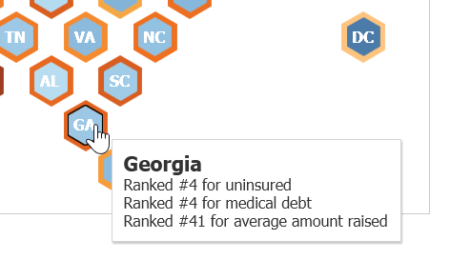Why Americans don’t boost, pharmacists get greedy, who loses their smell, and more
08 Feb 2022
Posted by Andrew Kantor
You want to be paid for your work?
Sheesh, pharmacists are a greedy lot. Did you know they actually want to get paid a reasonable fee for dispensing Covid antivirals? As if a whole dollar — one genuine American dollar! — isn’t enough.
But you know who is stepping up? PBMs! Yep, according to the CEO of PBM lobbying group PCMA*, they’re “stepping up, voluntarily, to cover dispensing fees for new oral anti-viral COVID medications,” and they’re apparently “paying standard or Medicaid-level” fees, too.
* Who we can absolutely trust.
UGA does another future-pharmacy-student partnership
This one’s with Georgia Gwinnett College biochem majors. The gist: If they meet UGA College of Pharmacy requirements as juniors, they’ll get priority applications, a guaranteed admission interview, and — if accepted — can transfer their credits and complete their bachelor’s degrees at UGA before going on to the PharmD program.
Who doesn’t smell
Covid-19’s notable symptom — the loss of taste and smell — seems to be more prevalent among certain types of people. Which types? According to French researchers, women, smokers, and people who had more than two drinks a day are more likely to experience taste or smell disorders.
And, to add injury to injury, it probably won’t be limited to that: “The overwhelming majority of patients with taste or smell disorders experienced a wide variety of symptoms.”
It’s all about the formulations
Different forms of medication — tablet/capsule, patch/cream, and so on — will have different prices. But patients don’t know this, and a group of U.S. business and medical researchers found that not only could patients “save up to 40% on prescription drug costs by switching to different formulations of the same medication, when available,” but:
In the analysis of costs for 28 medications available as a tablet or capsule, 33% of prescription orders were placed for the high-priced formulation.
There are obviously cases where a particular formulation is required for a patient. But it seems unlikely that it’s the case for a third of all prescriptions.
Crowdfunding: Don’t rely on the kindness of strangers
In the richest country on Earth, people who can’t afford their medical care turn to, well, asking strangers for money. Crowdfunding through sites like GoFundMe is the safety net they turn to. Unfortunately, an analysis by the University of Washington found that it doesn’t work.
Not only do 90 percent of campaigns fail to meet their goals, they found, but the ones that do are more likely to be in wealthier areas.
“[T]his data really indicates that where people need the most help paying for health care, crowdfunding provides the least help.”
Georgia, for example, has the fourth highest rate of uninsured people and the fourth highest level of medical debt — but ranked #41 out of the 50 states for the amount of money raised. (Mississippi is in worse shape: Highest debt, among the highest uninsured, and ranked last for money raised.)

What have we learned, Charlie Brown?
Every airplane accident makes us safer … assuming we learn from it. Ditto the pandemic. And one thing we’re still learning (95% of U.S. physicians say so!) is that America’s drug-supply chain is, well, let’s say “vulnerable.”
Reliance on foreign countries is a big problem — not only can their factories stop producing, but there’s the whole shipping issue — but it’s not the only one. USP, for its part, is working on it … for the next time.
Peanut allergy ender
Aussie researchers say they’ve found two treatments that effectively eliminate peanut allergies in half the kids they’re used on.
The first is a combination of a probiotic and oral immunotherapy (the gradual introduction of peanuts). The second was the immunotherapy alone. In both cases, about half the 1- to 10-year-olds it was tried on “achieved remission, allowing them to stop treatment and safely eat peanuts freely.”
The new research […] found after 18 months of treatment, 46 per cent and 51 per cent of children who received the combination treatment or the oral immunotherapy alone, respectively, were in clinical remission compared to 5 per cent in the placebo group.
(The study was actually to see whether probiotics helped with the immunotherapy treatment. It did not, but it did “enhance tolerability of the treatment, with fewer gastrointestinal symptoms,” which parents surely appreciated.)
Weird science* story of the day
Humans seem to have lost their sense of smell compared to our recent ancestors. So concluded a group of Chinese, American, and even a token Dutch biologist, looking at the genes of about 1,000 Chinese people.
They found that there’s a particular receptor for some common odors, and people have different genes that control that receptor. Those who had the older (“ancestral”) version of the receptor reported more intense odors.
In other words, the ‘newer’ version of this gene gives us a weaker smell receptor. (Or, as they put it, “the primate olfactory gene repertoire has degenerated over time.”)
* “Weird science”? So much for “I before E, except after C.”
The Long Read: Booster slowdown
“Why are Americans so slow to get booster shots?” asks the New York Times. Because unlike vaccinations in general, which have become politicized, the lack of boosterism cuts across those lines.
The vaccinated-but-unboosted more closely resemble the country as a whole. Millions of Americans who have already received two vaccine shots — eagerly, in many cases — have not yet received a follow-up. The unboosted include many Republicans, Democrats, and independents and span racial groups.


